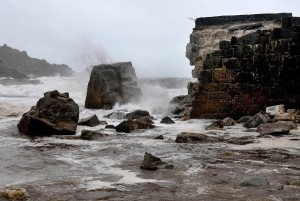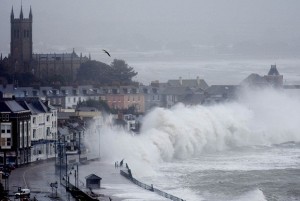It’s been a banner year for global warming. Here on the Olympic Peninsula we haven’t gotten much play from the polar vortex. More cold than usual came our way for awhile with temperatures down in the teens. As usual the sun has not spent much time visiting our dreary land and receiver of rain drops. Some times I rather miss the snow which has blanketed most of the country. People seem to talk about the weather more than ever. To look at my Facebook news feed you’d think some bright cable execs had whipped up something like CCC, The Climate Change Channel. My personal favorite program has been “Battering Cornwall” in which a coastline exposed to the unbroken flow of the Gulf Stream is pummeled by record breaking waves. On February 14, 2014 the Surfhog sea buoy off Penzance recorded a record 90 foot wave which beat out the previous winner at 75 feet about a week prior. Much of the action as the ocean comes ashore is captured on video. The scenes of waves breaking against ancient seawalls is very dramatic in an “not where I want to be standing” sort of way.
Sailors have lived with the power of the sea for as long it seemed like messing about in boats was a good idea. The sceptered isles have figured prominently in the lore of the sea and are no stranger to maritime drama. The current meteorological onslaught has taken many of us by surprise. The area has been the scene of memorable weather including the 1979 Fastnet Race in which a powerful storm took the lives of eighteen people. Further back in history the stormy North Atlantic wrote the final act of the Spanish Armada in 1805. Having failed to invade England with about a third of the fleet being turned to floating smudge pots by British fireships or hammered into kindling by Sir Francis Drake. They sought to escape by heading north up the channel to take advantage of the let’s go round it strategy often employed by those who engage militarily with island nations. Fortune and the weather were not with them as they came round the other side of Scotland. As a result the stormy North Atlantic scattered up to 24 wrecked galleons along the rocky coast of Ireland. There is great power in water. We mortals exalt in making it do our will when first we learn to doggy paddle, breast stroke, and do cannonballs off a diving board. Philosophers east and west have considered the nature of the wet medium for centuries. “Water is fluid, soft, and yielding. But water will wear away rock, which is rigid and cannot yield. As a rule, whatever is fluid, soft, and yielding will overcome whatever is rigid and hard. This is another paradox: what is soft is strong.â€Â -Lao Tzu-

The harbour at the world famous Lamorna Cove near Penzance in West Cornwall which was built in 1850 and has now been destroyed by the sea: Picture by Colin Higgs
This winter is the stormiest winter in England since they started recording weather events back in 1776. We have watched as one hammer blow after another has been delivered to the western side of the British Isles. It has washed away coastal rail lines and flooded quaint old villages that perch among the seacliffs like the rookeries of pelagic birds. The ocean puts on these displays as if to remind us who is in charge. It makes us feel small. Which has always been it’s job. It humbles us and calls to us. It reminds us that we are soft but can also be strong.



